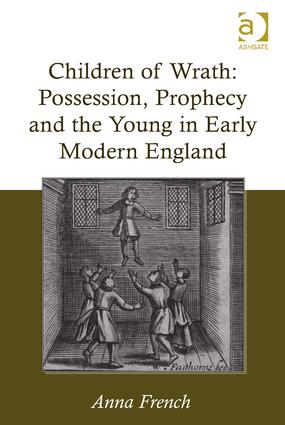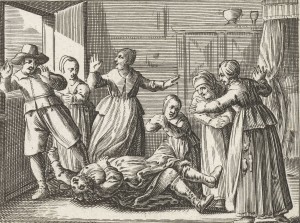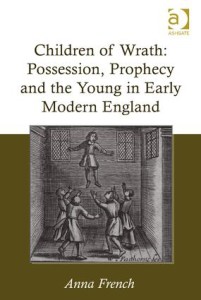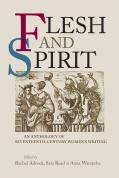
New Book Published – ‘Children of Wrath: Possession, Prophecy and the Young in Early Modern England’ – Anna French
 I have been meaning to (promising to) write a blog post on my recently published monograph, Children of Wrath: Possession, Prophecy and the Young in Early Modern England, for some time now. The book was published late last year by Ashgate (now Routledge), and it was a research project which began its life as my PhD thesis. In it I consider the dualistic nature of early modern perceptions of children, exploring the contrasting, but yet in many ways remarkably similar, cases of children’s involvement in occurrences of demonic possession and godly prophecy. Clearly such events, which saw children become entangled in instances of extreme behaviour, whether they were believed to be inspired by God or by Satan, were not typical life events for children in post Reformation England (one would hope, anyway!); but they can still reveal to us how early moderns may have imagined children, or how they may have perceived children, at the very limits of behavioural possibility.
I have been meaning to (promising to) write a blog post on my recently published monograph, Children of Wrath: Possession, Prophecy and the Young in Early Modern England, for some time now. The book was published late last year by Ashgate (now Routledge), and it was a research project which began its life as my PhD thesis. In it I consider the dualistic nature of early modern perceptions of children, exploring the contrasting, but yet in many ways remarkably similar, cases of children’s involvement in occurrences of demonic possession and godly prophecy. Clearly such events, which saw children become entangled in instances of extreme behaviour, whether they were believed to be inspired by God or by Satan, were not typical life events for children in post Reformation England (one would hope, anyway!); but they can still reveal to us how early moderns may have imagined children, or how they may have perceived children, at the very limits of behavioural possibility.
In the book I also consider Protestant education, and the moralistic ‘norms’ established in family advice literature. Such religiously inspired works, interestingly, saw children as sites of spiritual uncertainty and vulnerability – small beings with a unique potential to be open to the forces of good and evil, of God and the Devil.
This vision of children’s vulnerability began right at the start of their lives. They were believed to be conceived in sin, born naked and covered in blood (symbolising, again, their innately sinful nature), and they were baptised in an attempt to remove this sin (for Catholics) and (for Protestants) to symbolise God’s potential willingness to forgive this sin. For Protestants, whether or not infants were to be saved, to be granted eternal salvation, depended on God’s predestined will. Such powerlessness, my book argues, contributed to the problematic nature of spiritual perceptions of early modern children, especially for Protestants. And it was this problematic nature of early modern childhood, and the resulting conflicting perceptions of their salvation, that led, in part at least, to their involvement in cases of possession and prophecy.
 As I mentioned, this book began life as my PhD thesis, where I grappled with various contradictory ‘narratives of childhood’ (as I termed them), in various forms of printed source material. Since I began research into this area, I have sought to avoid the ‘definition’, or perhaps even label, of being a ‘historian of childhood’ per se. As fascinating as the study of childhood is, there is a tendency, if you only focus on that concept (which is, in itself, anachronistic), to look for evolution or development – when really the experience of being a child varied between periods as much as any other aspect of life in the past. Early modern societies held their own mentalities and assumptions, and these informed and shaped what it meant to be a child living at this time. Children of the early modern period, although they were children, had less in common with the young people of any other period than they did with the people who lived around them during their own lifetimes. There is, therefore, no single or threaded concept or singular notion, throughout history, of what it meant to be a child. Rather, I attempt to use my research into children to further our understanding of early modern society more generally, and especially our understanding of religious and spiritual changes. These interests have now led me to a new yet related area of research, which considers perceptions of infancy in the early modern world.
As I mentioned, this book began life as my PhD thesis, where I grappled with various contradictory ‘narratives of childhood’ (as I termed them), in various forms of printed source material. Since I began research into this area, I have sought to avoid the ‘definition’, or perhaps even label, of being a ‘historian of childhood’ per se. As fascinating as the study of childhood is, there is a tendency, if you only focus on that concept (which is, in itself, anachronistic), to look for evolution or development – when really the experience of being a child varied between periods as much as any other aspect of life in the past. Early modern societies held their own mentalities and assumptions, and these informed and shaped what it meant to be a child living at this time. Children of the early modern period, although they were children, had less in common with the young people of any other period than they did with the people who lived around them during their own lifetimes. There is, therefore, no single or threaded concept or singular notion, throughout history, of what it meant to be a child. Rather, I attempt to use my research into children to further our understanding of early modern society more generally, and especially our understanding of religious and spiritual changes. These interests have now led me to a new yet related area of research, which considers perceptions of infancy in the early modern world.
Anyway, I will leave the book itself to make further arguments about this topic. I hope readers enjoy it!
You can find out more about the book here.
Dr Anna French is a lecturer in early modern history at the University of Liverpool. 



The sacrament of Baptism in the Roman Catholic as well as high church protestant tradition (Lutheran, Anglican) is the complete removal of so-called Original Sin, the theological creation of St. Augustine. Personally, I do not know about low church attitudes/opinions/dogma. This is the main reason why an infant was immediately baptised if there was difficulty. Later on a Roman Catholic pope declared the existence of Purgatory as a place where the unbaptised souls of babies were sent after they died as they could not countence hell.